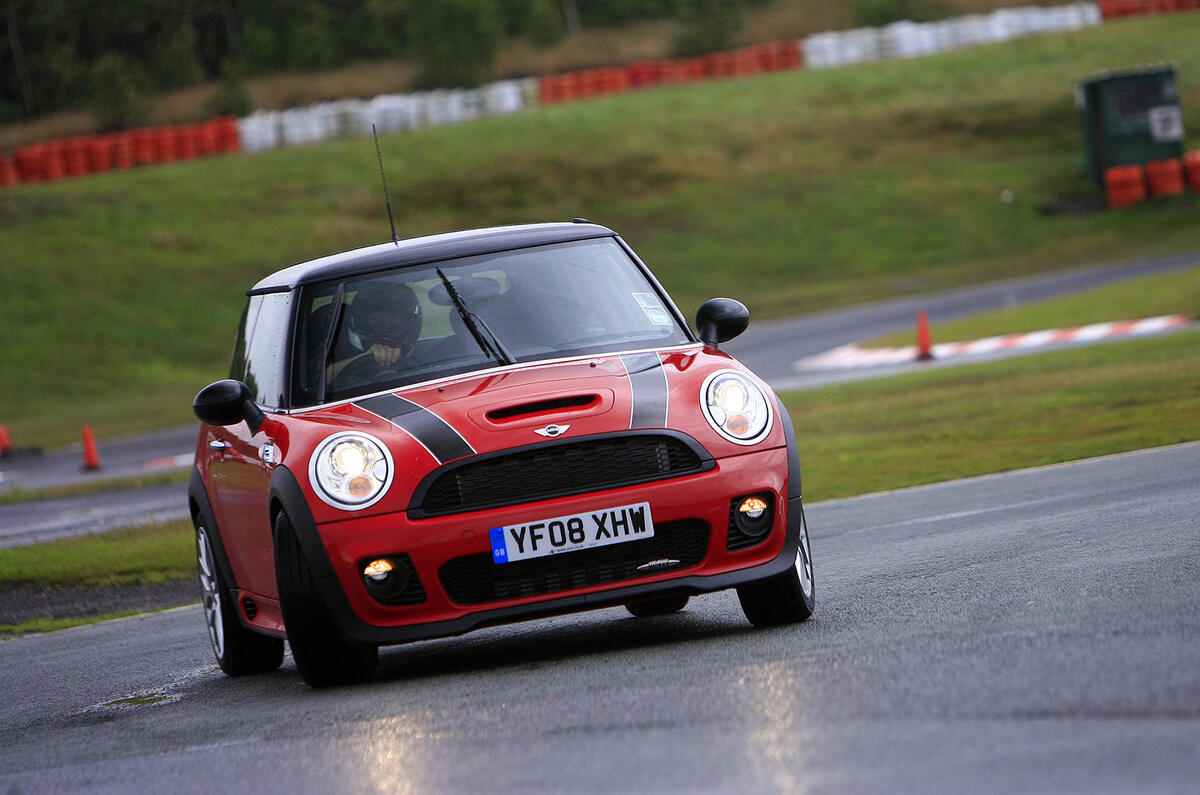The best first cars for new drivers – driven, rated and ranked
If you’re a petrolhead looking to stand out without paying through the nose for insurance, check out this list
News



by Jonathan Bryce, Charlie Martin and Murray Scullion
10 mins read
21 January 2025
Share
Are you after a four-wheeled friend that won’t be just some 1000cc shopping trolley with the verve and handling of one? If so, this best first cars list should be your bible.
Here we will help you choose a motor that is both cheap to insure and offers the driving involvement a petrolhead needs.
After untold hours of seat time across several decades, days spent poring over the classifieds and comparing more insurance quotes than we care to remember, our writers believe the Mini Cooper to be the pick of the bunch. After all, its sweet combination of handling and affordability has kept thousands of enthusiasts coming back for more.
Don’t fancy one? Each car on this list has a unique selling point to mark it out from the other slabs of metal in your average car park. From superminis to hot hatches, there’s a good option here for everyone.
And if you have a bit more money to play with, try our best used cars for enthusiasts article.
1. Mini 3-Door Hatch
10
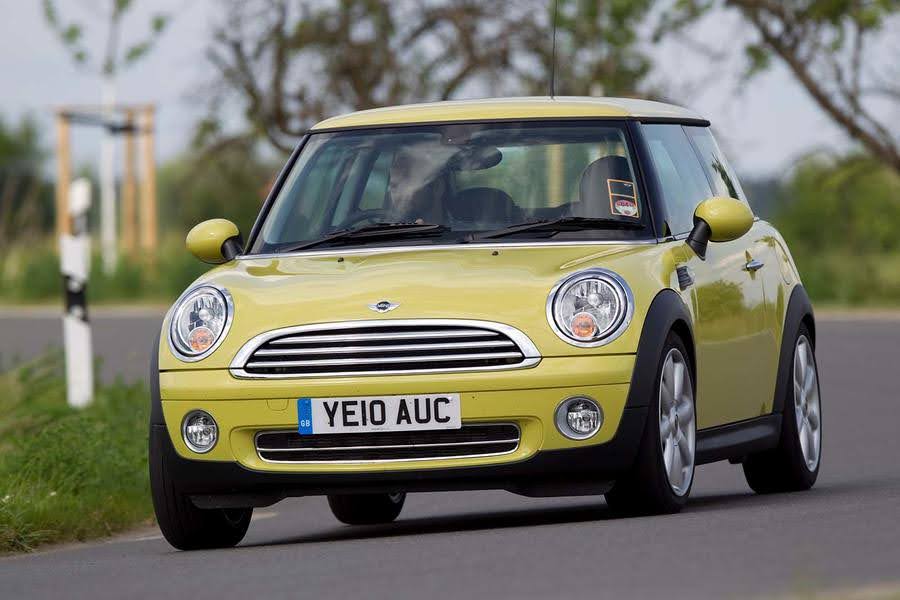
- Design10
- Interior7
- Performance10
- Ride & Handling9
- Costs10
Pros
All engines are ULEZ-compliant
Generally reliable
Cons
Poor practicality
Gearbox issues after a few years
Our recommendation: Mini Cooper
The Mini may be one of the most iconic cars in the world, but it also comes with a bit of exclusivity.
No fewer than 13 trim levels were available with a list of colour combinations and options form so extensive that it looked like a child’s Christmas wishlist. This means that no two Minis are likely to be the same, giving you a slice of car-park cachet.
This generation was birthed with the code ‘R56’ – ‘R’ standing for Rover. That doesn’t mean it uses any Rover bits, however, because this endlessly configurable hatchback was reliable with strong build quality and is now available for sensible money, with fully ULEZ-compliant petrol engines no matter which year you pick. Plus, it’s in insurance group 17.
Six engines were offered, ranging from a 1.4-litre petrol to a 2.0-litre diesel. While the diesels are a bit gravelly, they don’t detract from the fact that this is a reliable, fun-loving hatch that turns on a 5p piece and is instantly recognisable.
Problems? Practicality is quite poor and some cars have developed gearbox issues after living hard lives; just make sure to listen out for gearbox whine on the test drive.
Read our Mini 3-Door Hatch review
Finance this car with Drivenfi
Latest Reviews

Mercedes-AMG CLE 53
8

Volkswagen Tiguan
7

Honda Civic Type R
9

Used BMW 3 Series Touring 2012-2019 review
9
Used BMW 3 Series Touring 2012-2019 review

Aston Martin Vantage Roadster
Read our review
Car review

Mini 3-door Hatch
Now in its third generation, we find out if the bigger, cleverer and more mature Mini can still entertain like it predecessors did
Back to top
2. Toyota Yaris
9
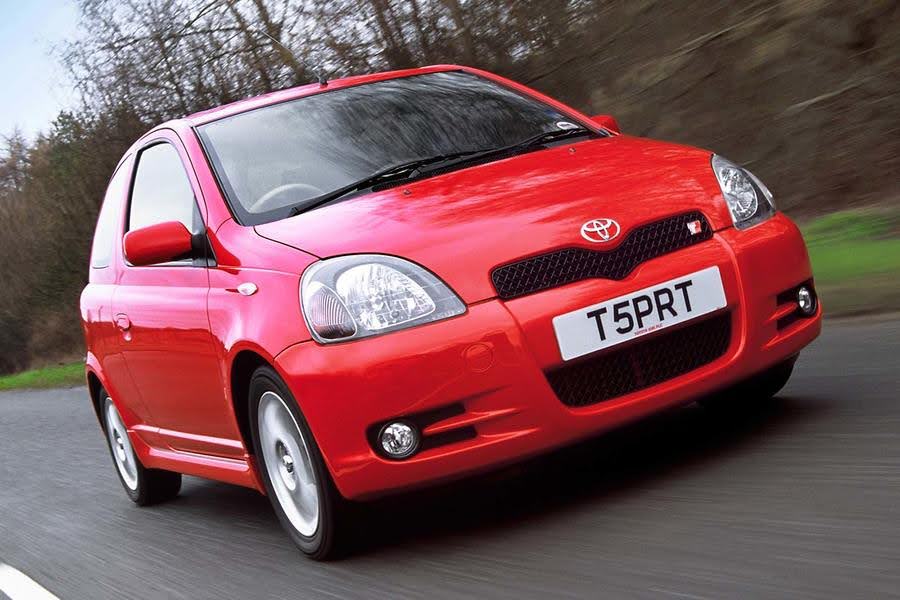
- Design6
- Interior6
- Performance10
- Ride & Handling9
- Costs10
Pros
9.0sec sprint from 0-62mph
Great five-speed manual gearbox
Cons
Not a looker
Poor interior
Our recommendation: Toyota Yaris T-Sport
This car was so typically Japanese and one of the last words in unconventional motoring.
When the regular Toyota Yaris arrived, it became Car of the Year thanks to its novel attention to detail, which means the flagship T Sport was built on bedrock foundations.
Less solid are its looks: it hasn’t aged quite as well as some others on this list. But it does have some exterior touches to make it look both interesting and endearingly odd at the same time.
Much like the interior, then. The air vents are like pastry cutters, there are huge pockets carved into the dashboard to store your clutter and where you’d expect to see an instrument binnacle there’s just plastic, because it has been moved to the left a bit (of course it has!).
By contrast, the engine wasn’t that weird: it’s a 1.5-litre atmo petrol. But it was one of the first to have variable valve timing, which enabled it to push out 103bhp and attain a 0-62mph time of 9.0sec. Power was sent to the front wheels via a five-speed manual – the only transmission on offer.
Read our Toyota Yaris review
Finance this car with Drivenfi
3. Fiat Panda
8
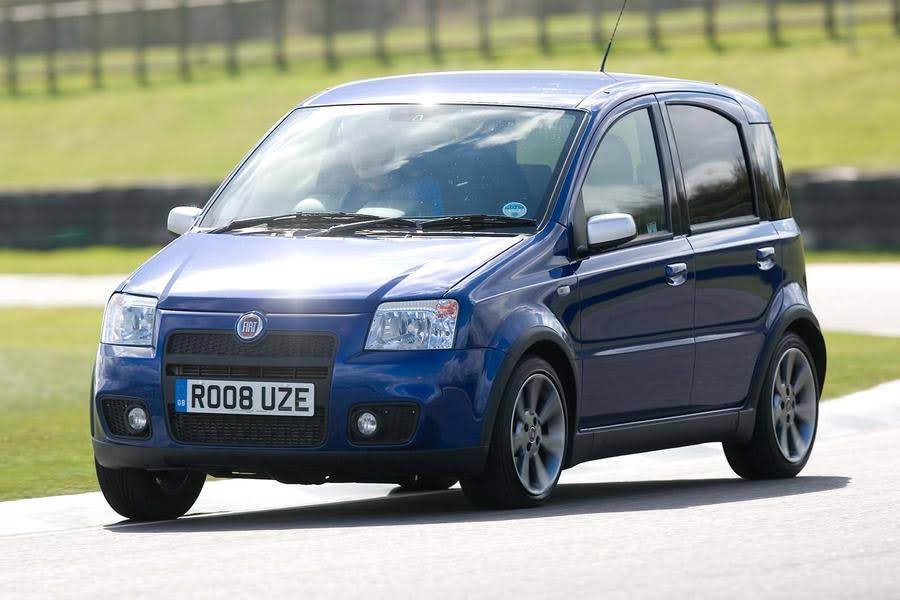
- Design8
- Interior6
- Performance8
- Ride & Handling7
- Costs8
Pros
Excellent value for money
Charismatic driving dynamics
Cons
Replacement parts are sparse
Cult status means prices are slowly rising
Our recommendation: Fiat Panda 100hp
Picture a Fiat Panda driver and you’ll probably think of a jolly pensioner on their way to pick up the week’s milk and bread. But your nan’s shopping cart this is not.
In true hot hatch tradition, Fiat transplanted the 1.4-litre overhead-cam engine from the then-new Grande Punto into its tiddly city car and eked an extra 5bhp out of it, for a total output of 99bhp.
That gives it a surprising turn of pace in real-world conditions because the car weighs a scant 975kg and it has a six-speed gearbox to keep the revs up.
Its cheeky character is backed by the reworked styling, with an expansive Audi-style front grille, flared arches at each corner, and a dinky spoiler at the back.
These were remarkably good value for money on the second-hand market for years but have recently achieved cult status so values are climbing. Expect to pay anywhere between £1000 and £6000, with restoration candidates on the lower end and low-mileage collectors’ cars on the higher.
Insurance is rated at group 11, making it one of the most affordable sporty cars to run as a first-timer.
But heed this warning: you need to buy one very carefully, as the number of bespoke parts on the 100HP can make it a nightmare when things go wrong. The rear beam axle, for example, is liable to rust and snap around the springs. It wasn’t used on any other car, and Fiat didn’t build very many 100HPs, so finding a replacement is tricky.
Likewise, you’ll want to be protective of the bodywork. The bumpers are made from recycled plastic so can be tricky to repair – some body shops will outright refuse to attempt a fix – and replacements cost around £400 each on the second-hand market.
But get a good ’un and you’ll own one of the most charismatic small cars of the past 20 years, which you can fully exploit without risking your licence or safety.
Read our Fiat Panda review
Finance this car with Drivenfi
Back to top
4. Suzuki Swift Sport
8
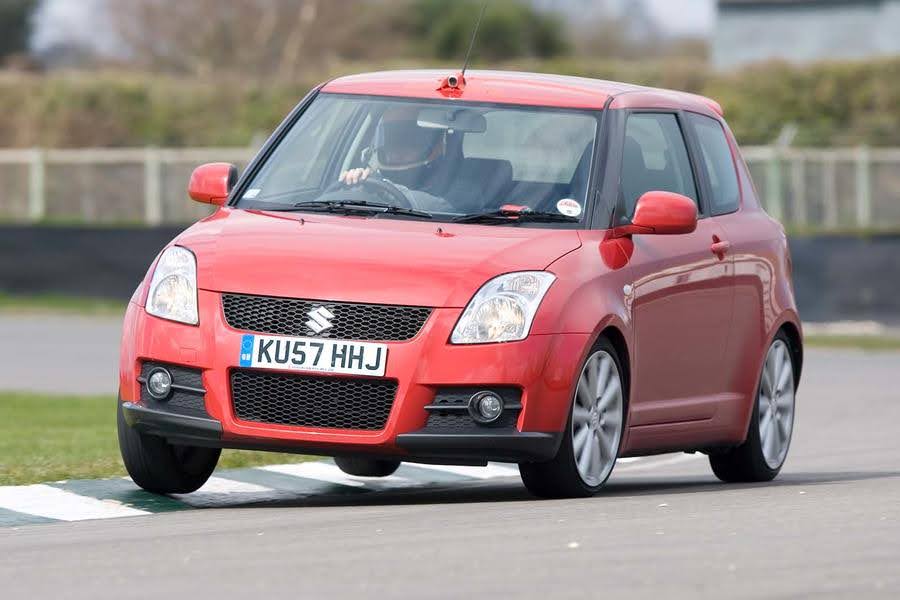
- Design7
- Interior7
- Performance8
- Ride & Handling8
- Costs8
Pros
Sub 9.0sec 0-62mph sprint
125bhp means it’s genuinely nippy
Cons
Slightly higher insurance group
Brand name might put some off
Our recommendation: Suzuki Swift Sport
You might not realise it, but the Suzuki Swift Sport is probably one of the archetypical hot hatchbacks – just like the Peugeot 205 GTi or Ford Escort XR3i.
They all have one thing in common: they’re normal hatchbacks with a small amount of spice to give them a tasty kick. The Swift Sport, for example, has a 1.6-litre engine and produces 125bhp. It dispatches 62mph in 8.9sec and has a top speed just shy of 124mph.
Fairly reserved figures, then – but remember that it weighs just 1.1 tonnes, which makes for a hugely attractive power-to-weight ratio if you’ve just passed your test and need to convince the insurers you know how to drive a car.
The price of used examples is equally reserved, both to buy and when you’re going through the insurers. Being in group 23, it’s in a slightly higher group than others on this list, but it’s still at the lower end.
Read our Suzuki Swift Sport review
Finance this car with Drivenfi
5. Ford Fiesta
8
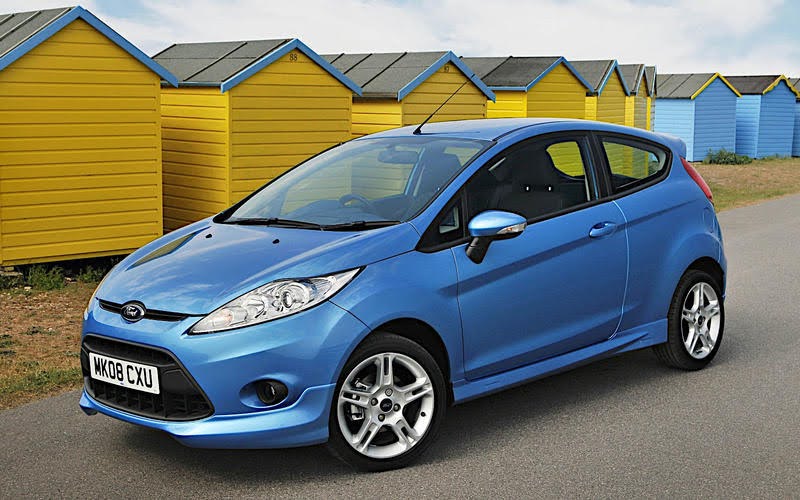
- Design8
- Interior8
- Performance8
- Ride & Handling8
- Costs8
Pros
Very cheap to buy
Fine-handling chassis
Cons
Some have been poorly modified
Insurance can creep up, particularly in London
Our recommendation: Ford Fiesta Zetec S
The Ford Fiesta was always going to make this list. It doesn’t matter which spec, which year or which price you get one for: beneath a pretty handsome shell lies a fine-handling chassis by which the competition was historically judged for nearly 50 years. You could even go so far as to call it the Porsche 911 of superminis.
The best part is that you can pick one up for pennies. You should, however, buy carefully. Some cars will have been tastelessly modified, and steer clear of cars that look ragged and neglected because you will probably end up paying for more in maintenance than you did for the car.
The very fact that they’re favoured by anyone from those who like to drive quickly to those who can’t drive at all means insurance costs can get quite steep if you modify them, particularly in expensive areas such as London.
Choosing a car isn’t so complicated, because there are loads of examples to go around. The most common engine available is the 120bhp 1.6-litre petrol, which pushes it to 62mph in a little under 10sec with a snappy five-speed gearbox.
Read our Ford Fiesta review
Finance this car with Drivenfi
Back to top
6. Seat Ibiza
7

- Design8
- Interior6
- Performance7
- Ride & Handling7
- Costs7
Pros
Cheap to buy
Diesel model an option
Cons
Bland interior
Not much space in the rear
Our recommendation: Seat Ibiza Ecomotive
The genius of the Seat Ibiza is that it blends a youthful fit and feel with complete ubiquity. People can drive something that isn’t too staid, all good in the knowledge that there are thousands of models on the used market to choose from. This makes it cheap to buy and among the cheapest cars to insure in the UK.
The exterior looks pretty sporty, but up front you will find low-powered engines that provide low running costs. Do a lot of motorway miles? We recommend going for the 1.4-litre diesel. It struggles less at speed than the low bhp petrols and will offer better MPG in this real-world application. Officially, it can get up to 80.7mpg.
Inside, it’s pure Volkswagen Group, in that it’s pretty bland but largely well put together. Plus, Apple CarPlay and Android Auto may be available, depending on which model you go for, giving you simple and instant access to apps such as Google Maps.
Read our Seat Ibiza review
Finance this car with Drivenfi
7. Renaultsport Twingo
7
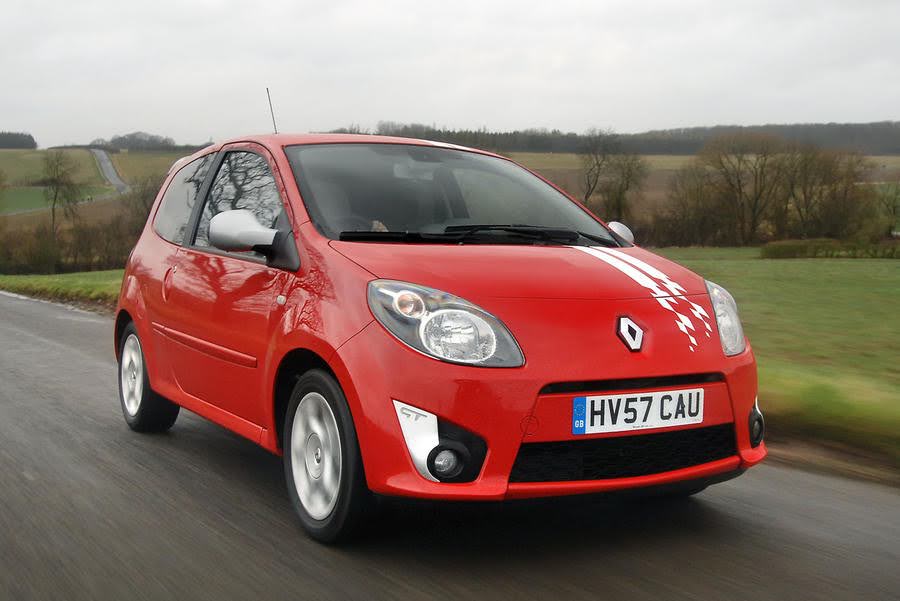
- Design8
- Interior5
- Performance8
- Ride & Handling7
- Costs8
Pros
Engaging handling
Low insurance group
Cons
One of the more mild options available
Quite hard to find
Our recommendation: Renaultsport Twingo GT
The Renaultsport Twingo is often hailed as one of the finest junior hot hatches ever, but it’s the slightly milder GT that you might want to turn your attention to as a new driver.
That’s because the GT sits in insurance group 17 rather than the RS’s 20, making it a slightly more realistic prospect for your first car.
It’s quite nippy too, with a turbocharged 1.2-litre petrol engine sending 99bhp through the front wheels in normal use. Stamp on the throttle in second, third or fourth gear, though, and it’ll overboost for up to a minute at a time, yielding 104bhp.
The Twingo GT is a light car, at 980kg, so it accelerates with surprising verve and handles decently in spite of its soft suspension set-up.
Around £2000 is enough to get you into a decent GT that hasn’t been to the moon and back, making it exceptional value for money in the current car market.
Read our Renaultsport Twingo review
Finance this car with Drivenfi
Back to top
8. Citroen Saxo
7
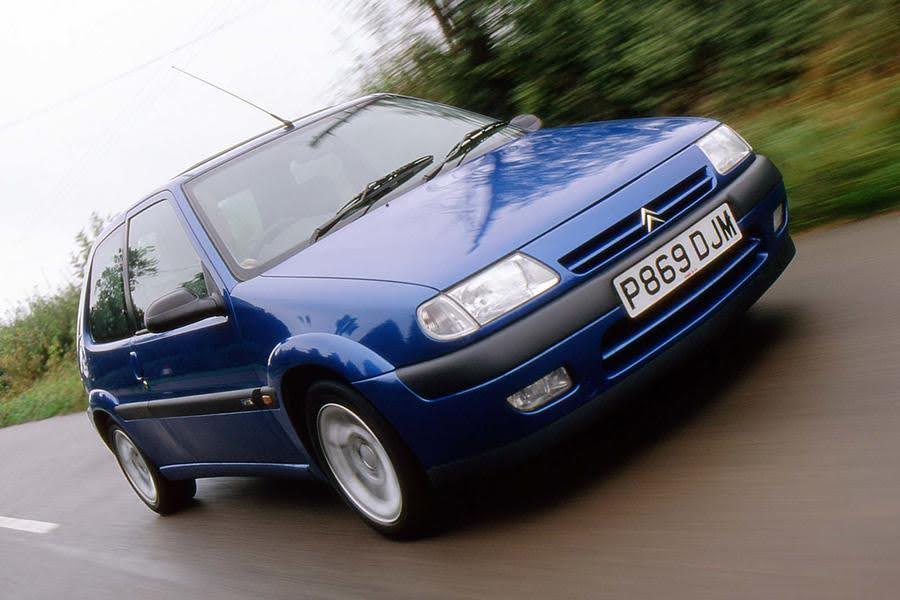
- Design7
- Interior7
- Performance7
- Ride & Handling7
- Costs7
Pros
Surprisingly potent on the open road
Engaging handling
Cons
Questionable safety levels
Prone to rust
Our recommendation: Citroen Saxo VTR
Sure, it’s a throwback to the bygone days of stuffing superminis with more ’woofer than Crufts, but the Citroën Saxo VTR still stacks up as one of the best entry points to performance motoring.
It has an older version of the 1.6-litre four-pot found in the C2 VTR, pushing out 90bhp. That might not sound very powerful, but it’s only got about 900kg of metal to cart around, so feels surprisingly potent on the open road.
This also plays in its favour in the twisties, where the Saxo can provide an entire education in lift-off oversteer.
Just beware that safety isn’t the car’s strong suit. It was rated at just two stars for occupant protection by Euro NCAP back in 2000, and anti-lock brakes weren’t standard on the VTR either.
You should also buy very carefully. The Saxo was a modder’s favourite back in the day, so plenty were fitted with questionable modifications – and you’ll have to declare any such changes to your insurer, likely incurring considerable costs.
They’re also plenty old enough to suffer from rust. Common problem areas are the rear axle, sills and wheel arches, but give the whole car a thorough check to be on the safe side.
Prices range from £2000 for a leggy car to £7000 and beyond for the best-preserved examples. The Saxo’s well on its way to modern classic status, though, so values are rising fast.
Read our Citroen Saxo review
Finance this car with Drivenfi
9. Citroen C1
7
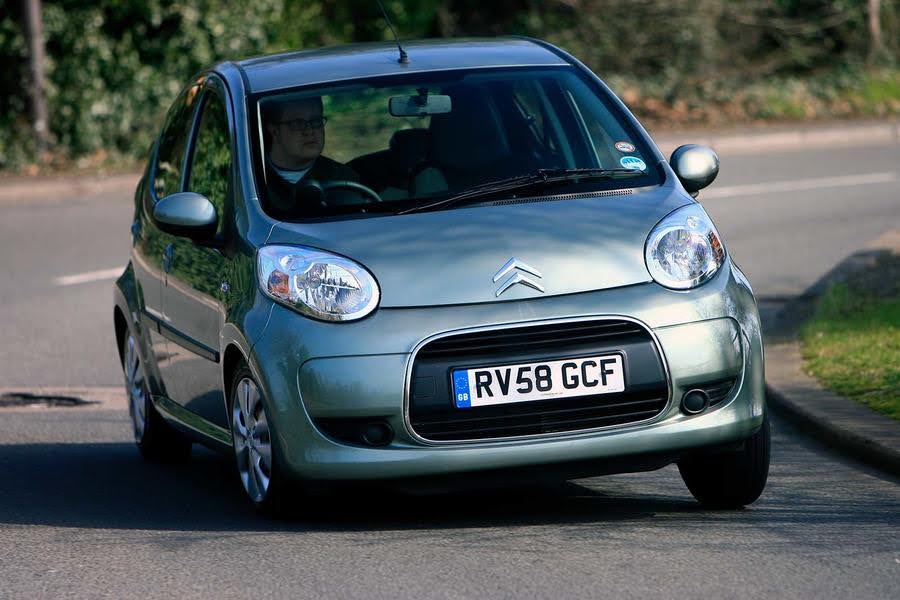
- Design7
- Interior6
- Performance6
- Ride & Handling6
- Costs10
Pros
Playful in the corners
Cheaper than a Fiesta
Cons
Fairly slow
Check carefully if they’ve been modified…
Our recommendation: Citroen C1 VTR+
Now, which self-respecting enthusiast is going to turn down such competition and plump for the no-frills, boggo Citroën that looks as interesting as bathwater and uses technology developed in tandem with the Gregorian calendar?
Well, those exact reasons are why you should buy one. Think of it as a blank sheet of paper – a cheery starting point for what could become anything you want, from a low-rider to a reliable tool for the uni commute. Or even a race car.
You can buy a conversion kit from a specialist site for £3700 that allows you to convert your bichon frisé into a track-ready pitbull. They look great if they’ve been modded well and don’t cost a fortune to fix, because you won’t need to spend that much on buying one in the first place.
It’s also slow, with just one litre of engine capacity. But what you lose on swings, you gain on roundabouts. It’s a joyous car to drive – playful, unintimidating and ready to take a beating.
It can be picked up for even less money than the Fiesta above, and insurance is just as cheap, because it’s in group three – one of the lowest on this list.
Read our Citroen C1 review
Finance this car with Drivenfi
Back to top
10. Volkswagen Up
7
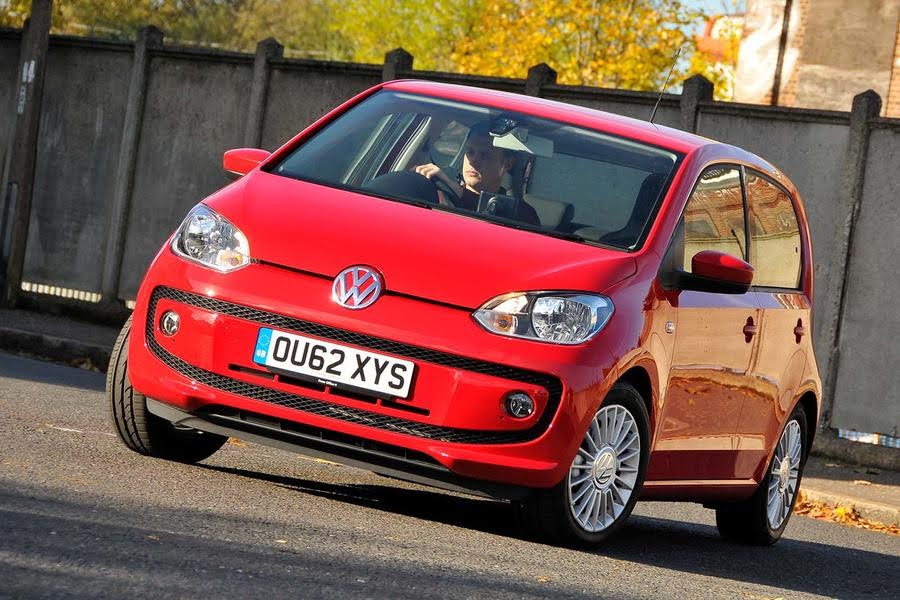
- Design8
- Interior7
- Performance7
- Ride & Handling7
- Costs8
Pros
Cheap to buy, insure and run
Handles with verve
Cons
Very slow in lower specifications
Our recommendation: Volkswagen Up Take Up
This joins our list in the same vein as the C1: it’s cheap both to buy and insure, and there are hundreds available for your picking and choosing.
But that doesn’t mean it isn’t interesting. It has charm. Character. Kudos, even.
Designed by Walter de Silva, once design boss at Alfa Romeo, the Up is one of those rare occurrences of a cheap car made desirable not through its badge but by clever engineering.
It has one of the longest wheelbases in its class and the wheels are pushed right out to the far corners, which means it handles with verve and is spacious inside. You can easily fit four adults in it and still get a spare wheel under the boot.
It’s not just cleverly packaged either: its 1.0-litre engine sounds fantastic, despite being comedically slow. It was offered in two states of tune: 59bhp and 74bhp.
But that leisurely pace can be a fun factor in its own right, and you get the by-product of cheap running costs. It’s in group two for insurance, it achieves more than 50mpg and spare parts are available like iron on Mars.



